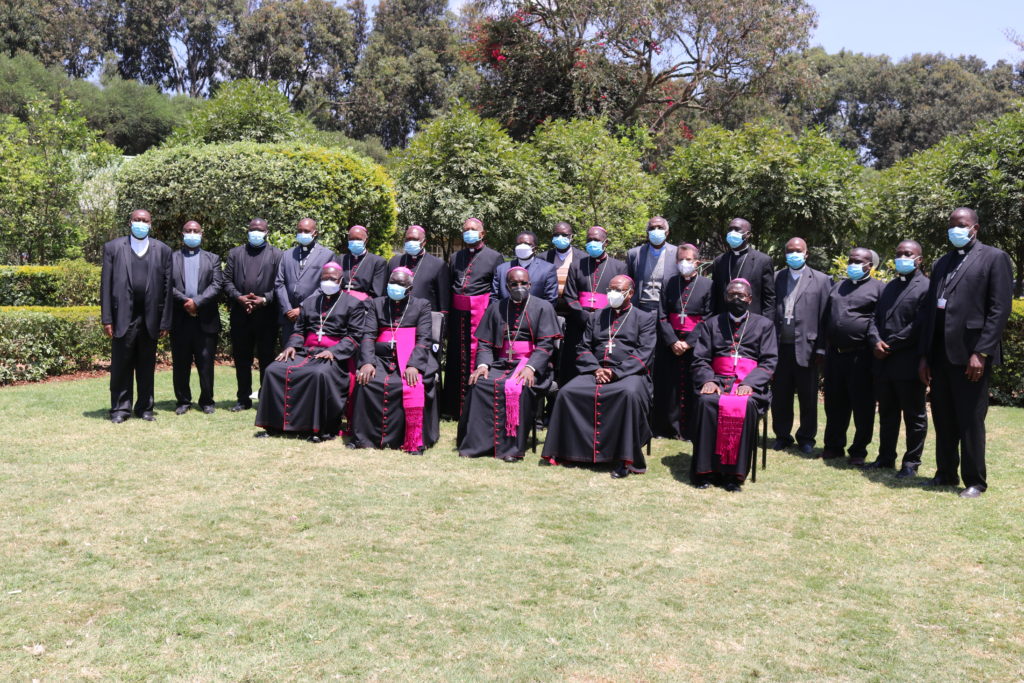KENYA: Bishops Conference Calls for Government’s Active Participation in Upcoming UN Binding Treaty Deliberations

Members of the Kenya Conference of Catholic Bishops (KCCB)
Sr. Jecinter Antoinette Okoth, FSSA
Members of the Kenya Conference of Catholic Bishops (KCCB) have asked Parliamentarians after a two-day training in Kenya’s Nakuru Diocese to urge Government to participate actively in the upcoming United Nations (UN) Binding Treaty deliberations that are to take place late this year.
In the statement released after the training which concluded on Thursday, September 9, the KCCB Chairman for Commission for the Promotion of Integral Human Development (PIHD) Bishop John Oballa Owaa appealed, “We humbly request the Departmental Committee of Environment and Natural Resource to lobby Kenya Government and urge them to actively participate in the 2021 United Nations Binding Treaty deliberations.”
The negotiations are slated to take place in Geneva, Switzerland from November 25 to 29.
Late last year, members of KCCB urged the government to support the current second revised draft of the Treaty aimed to uphold the right of every person to have effective and equal access to justice in case of violation of international human rights law.
They noted that “the second revised draft aims “To facilitate and strengthen mutual legal assistance and international cooperation to prevent human rights abuses in the context of business activities and provide access to justice and effective remedy to victims of such abuses.”
Bishop Oballa who is the Local Ordinary of Ngong Diocese reminded Members of Parliament (MPs) at the training organized by KCCB Parliamentary Liaison Desk, the commitment of the Catholic Church in areas of Business and Human rights for the last five years.
“We strongly believe that the actions of business enterprises such as Transnational Corporations (TNCs) can affect people’s enjoyment of their human rights either positively or negatively,” the statement shared with AMECEA online reads in part and continues, “Our experience in Kenya is that these enterprises can and do infringe human rights with cases of Environmental degradation, displacements, inadequate compensation and land grubbing.”
According to the PIHD Chairman while speaking on behalf of the Bishops, the Catholic Church driven by the option for the poor and common good principles, “holds that the local communities should benefit from the resources equitably and their rights protected.” Besides, “Policies and legislations should secure communities interest and TNCs held accountable for their actions.”
The Prelate disclosed that “violations of human rights and the rights of peoples and nature have become inherent to transnational corporations operations, as well as systematic,” and “at the international level there is no binding rule for corporations on Human Rights.”
Additionally, during the two-day partnership and diplomacy legislative closed-door meetings with national assembly departmental committee of environment and natural resource, the Bishop reminded MPs on the need to care for environment saying, “If we do not take care of each other, starting with the least, those who are most affected, including creation, we cannot heal the world.”
“Creation is a harmony in which we are called to live. This harmony created by God asks us to look at others, the needs of others, the problems of others, to be in communion,” he said adding that, “We need to recognize human dignity in every person, whatever their race, language or condition.”
On the training themed “Deepening Democracy by Facilitating and Participating in Public Policy for the Common Good,” the Bishops reiterated their “commitment in continued partnership with the Committee of Environment and natural resource in policy advocacy work for the common good of all Kenyans.”


